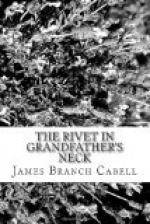“Why, but of course. It is the last thing I will ever be allowed to do for him,” she had said, in innocent surprise. “Why shouldn’t I?”
Her air was such that you were both to talk to her about appearances.
“Because she isn’t a bit like a widow,” as Mrs. Ashmeade pointed out. “Anybody can condole with a widow, and devote two outer sheets to explaining that you realize nothing you can say will be of any comfort to her, and begin at the top of the inside page by telling her how much better off he is to-day—which I have always thought a double-edged assertion when advanced to a man’s widow. But you cannot condole with a lantern whose light has been blown out. That is what Anne is.”
Mrs. Ashmeade meditated and appeared dissatisfied. “And John Charteris of all people!”
Anne was presently about the Memorial Edition of her husband’s collected writings. It was magnificently printed and when marketed achieved a flattering success. Robert Etheridge Townsend was commissioned to write the authorized Life of John Charteris and to arrange the two volumes of Letters.
Anne was considered an authority on literature and art in general, through virtue of reflected glory. And in the interviews she granted various journalists it was noticeable that she no longer referred to “Jack” or to “Mr. Charteris,” but to “my husband.” To have been his wife was her one claim on estimation. And, for the rest, it is inadequate to love the memory of a martyr. Worship is demanded; and so the wife became the priestess.
II
Into Colonel Musgrave’s mental processes during this period it will not do to pry too closely. The man had his white nights and his battles, in part with real grief and regret, and in part with sundry emotions which he took on faith as the emotions he ought to have, and, therefore, manifestly, suffered under.... “Patricia was my wife, Jack was my brother,” ran his verdict in the outcome; and beyond that he did not care to go.
For death cowed his thoughts. In the colonel’s explicit theology dead people were straightway conveyed to either one or the other of two places. He had very certainly never known anybody who in his opinion merited the torments of his orthodox Gehenna; so that in imagination he vaguely populated its blazing corridors with Nero and Judas and Caesar Borgia and Henry VIII, and Spanish Inquisitors and the aboriginal American Indians—excepting of course his ancestress Pocahontas—and with Benedict Arnold and all the “carpet-baggers” and suchlike other eminent practitioners of depravity. For no one whom Rudolph Musgrave had ever encountered in the flesh had been really and profoundly wicked, Rudolph Musgrave considered; and so, he always gravely estimated this-or-that acquaintance, after death, to be “better off, poor fellow”—as the colonel phrased it, with a tinge of self-contradiction—even if he actually refrained in fancy from endowing the deceased with aureate harps and crowns and footgear. In fine, death cowed the colonel’s thoughts; beyond the grave they did not care to venture, and when confronted with that abyss they decorously balked.




